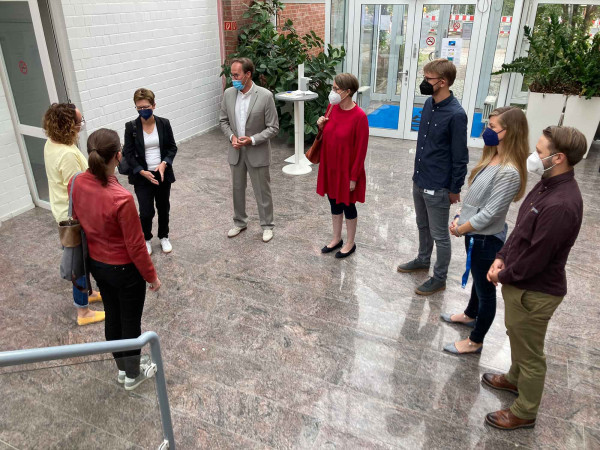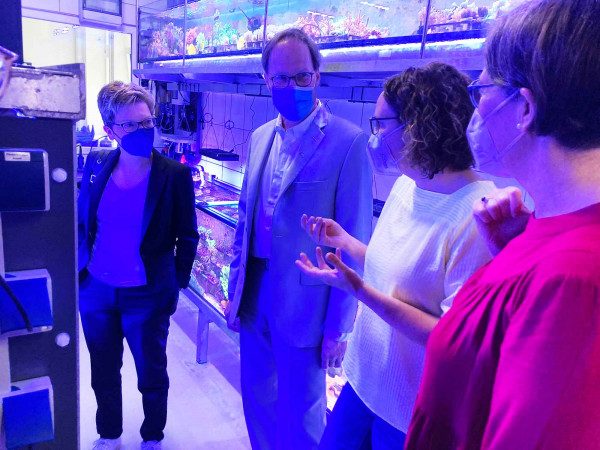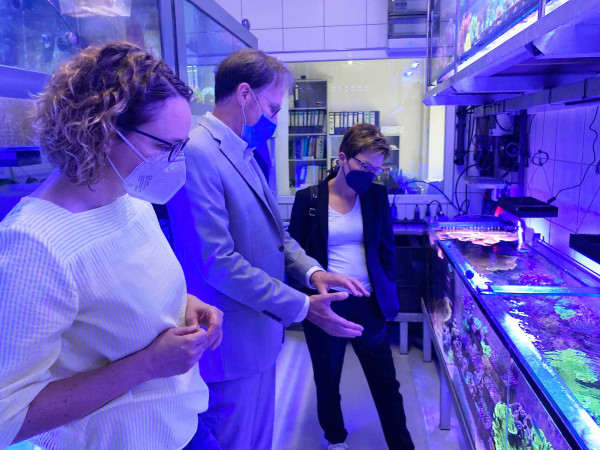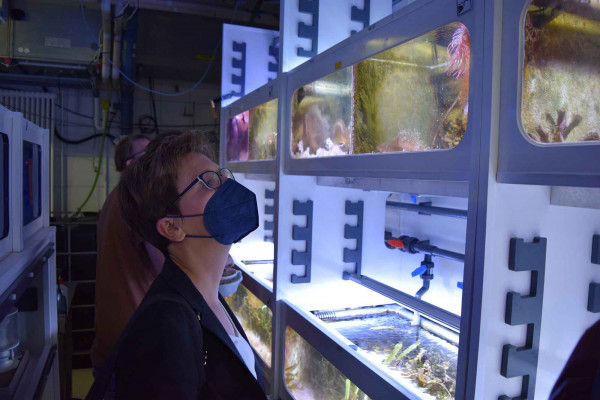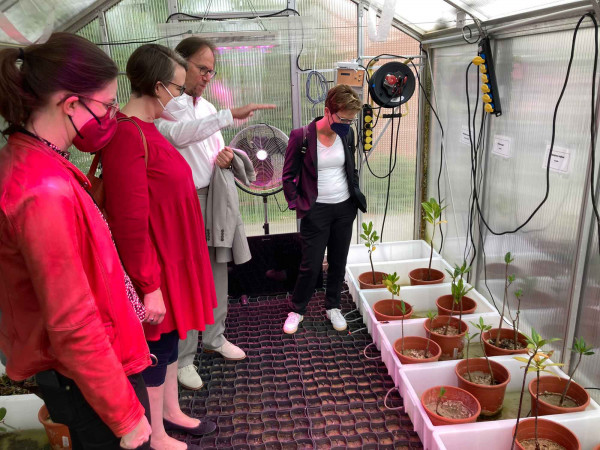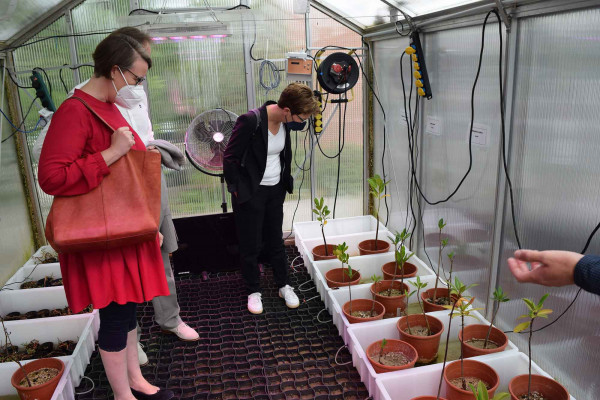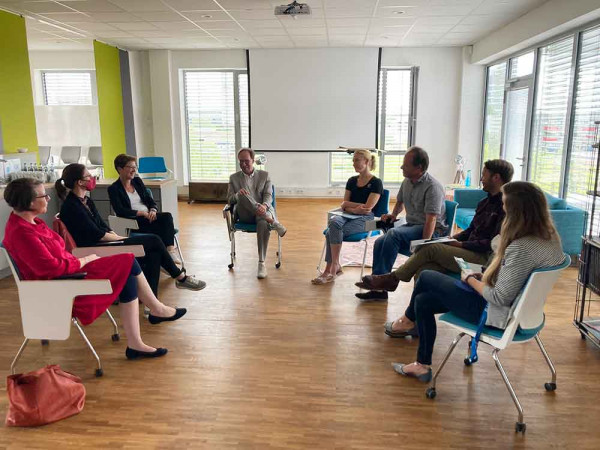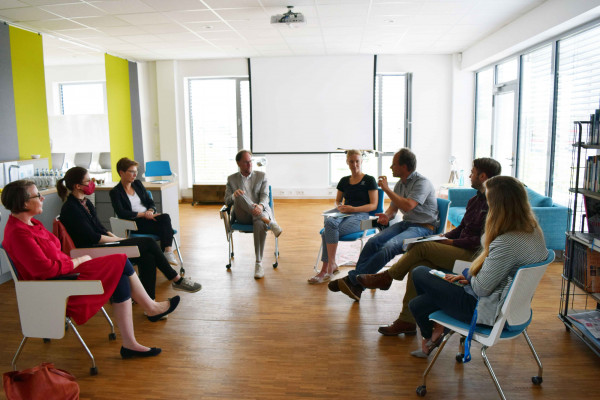On Thursday (28 July), the Senator for Science and Ports of the Free Hanseatic City of Bremen, Dr Claudia Schilling, spent a morning at the Leibniz Centre for Tropical Marine Research. During her visit, the Senator was accompanied by Dr. Michaela Muylkens (Head of Department 22 - Science Planning and Research Funding) and Sara Bergemann (Head of the Senator's Office). Dr Schillingand her colleagues got an overview of current topics in tropical coastal research and the development of the institute.
After a warm welcome by ZMT's scientific diector, Professor Raimund Bleischwitz, the guests first took a look at the marine experimental facility (MAREE), where Silvia Hardenberg (Head of the MAREE) gave an insight into research on jellyfish as a food source or current work on the effects of climate change on the distribution of reef fish.
Dr Jonas Geburzi showed the senator and her colleagues around ZMT's mangrove greenhouse, where eight different mangrove species are currently thriving far from their native habitats - their leaves are currently being used for feeding experiments with crabs and snails. The ensuing discussion focused on the relevance of mangrove ecosystems for climate protection, as mangroves absorb huge amounts of CO₂ and store it as carbon in their sediment. This so-called 'blue carbon', which is stored by coastal and marine ecosystems, plays an important role when it comes to nature-based solutions for climate protection. In the discussion, sustainability researcher Raimund Bleischwitz emphasised that investments in 'blue carbon' should always be accompanied by research, as conducted at ZMT, in order to be able to apply reliable measurement methods for ecosystem services.
During her visit, Senator Schilling exchanged views with researchers from ZMT on a number of projects. Rebecca Lahl, for example, gave an insight into the institute's cooperation with partners in the tropics and described the ZMT as an "inspiring place of learning where people from all over the world conduct research together to find solutions for marine conservation and sustainable development".
Dr Micro Wölfelschneider reported on the research network "sea4soCiety", which the ZMT coordinates. As part of the research mission "Marine Carbon Storage as a Path to Decarbonisation" of the German Alliance for Marine Research (DAM), the network brings together more than 40 scientists.
The guests gained insight into the important social science research at ZMT during a discussion with Professor Achim Schlüter. Marine social sciences and socially relevant research are a special characteristic of ZMT, Schlüter emphasised. He went on to illustrate Bremen's close links with the tropics by means of the tourism sector and presented projects from this area. In Indonesia, Tanzania, Costa Rica, ZMT is investigating how wastewater discharged into the sea from tourist facilities affects marine ecosystems, human health and tourism, which depends on an intact natural environment. In the future, the social scientists want to address the question of the extent to which the potential for sustainable tourism has grown as a result of the Corona pandemic and how people's attitudes towards travel have changed.
The topic of 'marine pollution' was also the subject of the research project of Dr Carolin Müller, who is investigating how the ingestion of microplastics affects the early life stages of fish. In her studies, she examined seabream, a popular food fish, and found that fish are disturbed by the ingestion of microplastics not only in their growth, but also in their hormone balance. Although the problem of plastic pollution of the seas and oceans has been known since the 1970s, too little is still known about how plastic affects fish, says Müller.
Senator Schilling on her visit to ZMT: "I am pleased to have gained an insight into the exciting research at the Leibniz Centre for Tropical Marine Research (ZMT) today. With its work, ZMT makes a significant contribution to Bremen's outstanding position as a science location. The institute plays an important role in finding answers to urgent future questions in tropical coastal research and is a sought-after cooperation partner both nationally and internationally."
"We are very honoured that Senator Schilling's visit not only underlined the outstanding position of marine research in Bremen, but also the work at ZMT in particular," Raimund Bleischwitz summed up the morning. "At ZMT we are dedicated to tropical coastal ecosystems, which is certainly unique in Germany. In doing so, we not only work on basic research, but are also very committed to finding future-oriented solutions to problems - be it in the field of sustainable use of marine resources and tourism, in connection with 'Blue Economy' and 'Blue Carbon' or in climate and marine protection."





